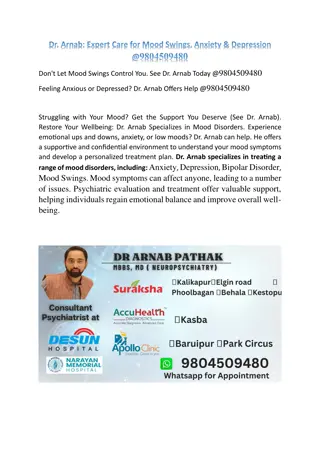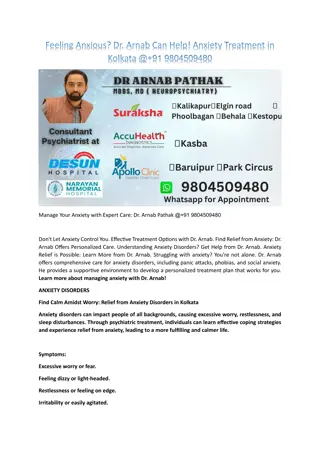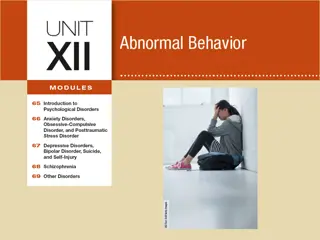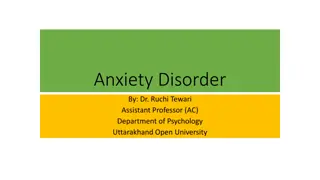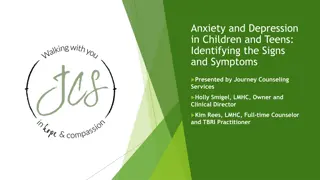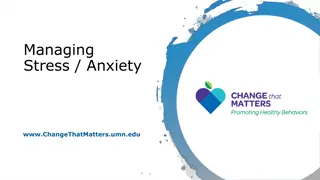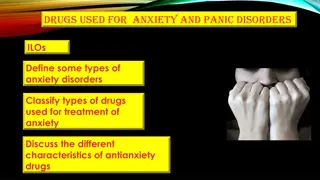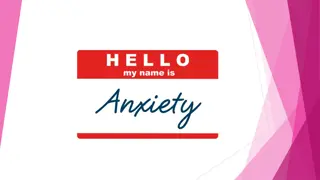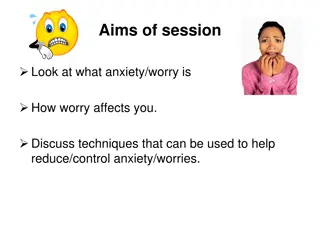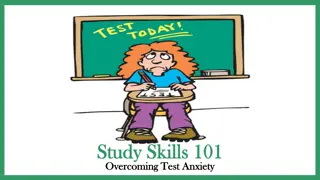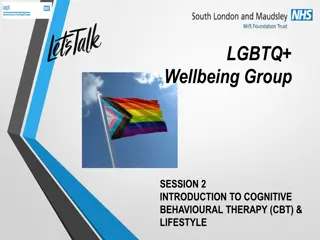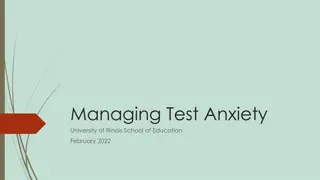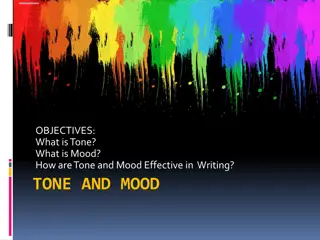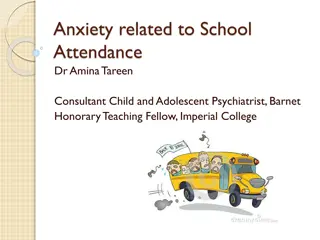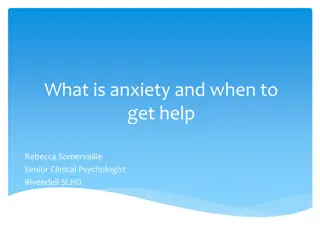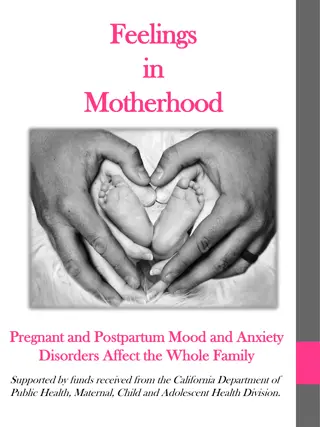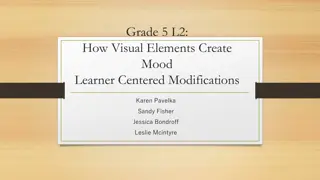Strategies to Improve Low Mood and Reduce Anxiety
Addressing feelings of low mood and anxiety, this program provides practical steps and strategies for improving mental well-being. It includes insights on changing assumptions, problem-solving, seeking support, and considering medication options. The content emphasizes the importance of cognitive therapy, problem-solving skills, social connections, and medication interventions in enhancing mood and managing anxiety levels.
Download Presentation

Please find below an Image/Link to download the presentation.
The content on the website is provided AS IS for your information and personal use only. It may not be sold, licensed, or shared on other websites without obtaining consent from the author.If you encounter any issues during the download, it is possible that the publisher has removed the file from their server.
You are allowed to download the files provided on this website for personal or commercial use, subject to the condition that they are used lawfully. All files are the property of their respective owners.
The content on the website is provided AS IS for your information and personal use only. It may not be sold, licensed, or shared on other websites without obtaining consent from the author.
E N D
Presentation Transcript
Handling Anxiety and Low Mood January 29, 2021 Patrick Tang, MPH Program Manager Ed Fisher, PhD Global Director
AGENDA Access all recorded webinars and slides at 1. About Low Mood https://go.unc.edu/PROSPER a. Strategies to improve low mood b. Practical Steps 2. About Anxiety a. Strategies to reduce anxiety b. Practical Steps 3. Summary
INTRODUCTIONS 3 www.peersforprogress.org
ABOUT LOW MOOD 4 www.peersforprogress.org
About Low Mood Feeling Blue Sometimes we can t see anything going wrong that we re bothered by, but we just feel down about ourselves or the future. We feel we re not achieving what we want or doing the things we had anticipated would make us happy. Our children are fine, our marriage is pretty happy, our work is going well, our health is good, but we just feel is that all there is? Sometimes, on the other hand, we know what is bothering us. There may be specific problems that we just can t get a handle on or make go away, like a nagging conflict in the family or with your job. Without intending, we ve stopped doing things that give us pleasure and are having trouble reviving them, getting back in the game.
Four Strategies to Improve Low Mood Changing Assumptions Often referred to as cognitive therapy or cognitive behavior therapy, identifying and changing the ways in which we think about things a hurtful remark, for example can help us feel less hurt and feel better about things. Problem Solving Sometimes we feel bad because of nagging problems that won t go away a sore point in our marriage or a chronic disagreement with a teen-age child. Learning how to solve such problems can improve our mood. Getting and Giving Support We all need to feel connected to others both through the support they give us and through our feeling important to them. We want a two-way street. Medications As you know from watching TV, there are many prescription medications available for feeling blue or low mood or depression.
Changing Assumptions Sometimes, how we look at things the half of the glass that s full or empty makes a big difference in how we feel. We see this easily in others, Why is he so sensitive? But it s harder to see it in ourselves, Why anyone would be hurt by that! If you seem to keep being bothered by a type of situation feeling slighted by those you care about, feeling criticized or ignored at work, feeling treated badly in public such at stores try keeping records and examining three things: 1. What happened 2. How did you interpret it 3. How did that make you feel Do you see a way that changing #2 might make you feel better?
Changing Assumptions, continued If you are having trouble seeing things you can change about how you interpret or think about things that bother you, you might try one of these: Think of someone you know well who handles things well. How would they interpret the things that bother you so much? What would a good friend think about how you are interpreting things? Asking a good friend whom you trust to help you with this. When you have identified the ways you are interpreting things that make you upset, you can then identify how you would rather interpret them: Instead of He s always critical of my work, He picks on everyone, especially when he s under a lot of pressure. Instead of If he really loved me, he would never say that, He must have been really hurt by what I said. Make a list of the ways you would like to interpret them and then practice using those thoughts instead of the ones that make you unhappy: Keep records every day if you can of when things bother you and how you react. You won t get it perfect, but you ll begin to catch yourself and then substitute the interpretations that make you feel happier.
Discussion What is an example of a way you changed your interpretation of something that had bothered you? 9 www.peersforprogress.org
Problem Solving Sometimes we get to feeling blue or down because there s a nagging problem we just can t fix or solve. It may be: A conflict with our spouse that just keeps coming between us A conflict with our child that adolescence is not making go away A problem at work, perhaps with our boss or coworkers These problems are not all in your head sometimes, they are objectively someone else s fault. Nevertheless, you are the one who is feeling bad and whom we care about. So let s see what you can do about it.
Problem Solving, continued The key to problem solving: Be Specific We can t solve problems like: My boss doesn t like me I m always procrastinating Arguments over my children s homework We need to make them more specific: who, what, where, when, how Who: My oldest son who is 16 What: Working on his homework Where: In his room When: After dinner on weeknights How: He starts off texting friends and never gets to his homework until about 10
Problem Solving, continued To get to the specifics, start off with the general problem Let s say recurring arguments with my spouse. Then think about examples. It may be helpful to keep notes for a week or so. Try to identify the specific arguments that are most common or that seem to be most typical of what s bothering you. Use good judgment: you may want to try to work on the most troublesome or most upsetting version of the problem or you may want to start with something that you both feel easier about. Then specify the problem in as many ways as possible Who, what, where, when How is it upsetting? What is most bothersome? What are the sore points or triggers?
Problem Solving, continued Next is coming up with possible solutions. Here is another key to success: Generating solutions is not the same as Choosing the best one. In generating solutions, you want to be as creative thinking out of the box as you can be. Start with something absurd, like going away for a month to avoid recurring arguments after dinner. That may lead to something you wouldn t have thought of, like going for a walk after dinner Generate as many possible solutions as possible. Take some time with this and, probably, write them down. And don t forget specificity: Make the solutions as specific as possible.
Problem Solving, continued Finally, we come to choosing and implementing. Choose the solution you think best or with which you are most comfortable. Maybe ask a friend to help with this. Think through the details: Will you do it on your own or involve your spouse/child/coworker/boss, etc.? Will you tell others involved what you are trying to do, or just try it? What will be hardest for you to do and how can you ensure you ll do it? Then try it. It s pretty likely it won t work perfectly the first time so be prepared to revise, try again, trouble shoot how you are missing, etc.
Discussion What is an example of how you addressed a problem to make you feel better? 15 www.peersforprogress.org
Getting and Giving Support The first step in getting and giving support is connecting with others. When we were children, this may have happened naturally through school and playing with others in our neighborhoods. As adults, it can take effort Our coworkers may provide a sense of connection, but that can be complicated by demands of the job, conflicts, or supervisors that make us feel always needing to be on our guard Families are a huge source of support for many of us, but there are times when we want someone outside the family to help us put things in perspective or make us feel they are just on our side So, think about who are your friends, whom you can turn to, with whom you enjoy doing things. You may need to take some initiative in developing some connections, maybe through church or other groups, identifying some coworkers with whom you feel comfortable getting together outside of work.
Challenges in Getting Support There are two things that get in the way of our getting support 1. Many of us are not comfortable getting support This can be because of cultural or other influences: Lots of women feel they need to meet everybody else s needs before thinking of their own. Lots of men feel they need to be the rock of Gibraltar or John Henry. The evidence is clear, however. Being socially isolated, feeling that you don t have someone you can turn to, is as big a cause of death as smoking cigarettes. Humans just do better when they have others with whom they can talk about personal matters or call on for a favor. 2. People are often not very good at realizing what support others need or sensitive in supporting each other We need to be given hints sometimes more than hints about what others need. We often overlook the obvious, for example, forgetting that someone who lost a close relative a couple of months ago is probably still going through some hard times.
Letting Others Know People can t read our minds We need to tell them what support we need This may mean letting them know about an issue they wouldn t notice My partner s father is going through some really bad health challenges, so I m sorry if I may not be at my best. They may need help in figuring out what would be most helpful to you I really appreciate your concern, but what I m finding is that it s just a relief to me to concentrate on the job and not have to think about those other things. What would really help me is if we could get a cup of coffee together and let me tell you what I m going through. It s also important to thank others and give them feedback Thanks for asking about my parent s situation. I don t want to be talking about it all the time, but your letting me know you are available to talk is really helpful.
Giving Support We can t read others minds We need to ask them what support would be helpful I can imagine this must be tremendously upsetting to you. I m not sure what would be helpful, but if I can do anything or if you d like just to go for a walk or something, just let me know. We need to watch out for others. Many will be hesitant to say that they are going through a tough time. Keep your eyes and ears open and reach out to folks having problems. Don t be hesitant but don t make too many assumptions either I know what you are going through is really hard, but I m not sure how I can be helpful. Would it be helpful to talk or go get lunch together, or just to know that I m here for you if you need me. Please let me know what I can do. It can be really challenging to support a friend or coworker who lost a family member You don t need to say anything all that sophisticated, just that you are sorry for the loss and hope they and their family are getting through it OK. It s often helpful just to ask about the person who has died, just simple things like how old they were, what work or interests were important to them, etc. However, some may find such conversation painful so be prepared to drop it and just reassure them that you are there for them. Don t forget the good stuff congrats on a promotion or particular accomplishment or birth of a child, etc.
Medications Your family doctor or primary care provider can prescribe medications that may help boost your mood. Some of these are pretty tricky in terms for example of ways you need to be careful about your diet or with alcohol, so make sure you understand any medication you are prescribed and follow guidelines carefully. There is some controversy about whether mood elevating medications should be taken for a long time or not. You may want to discuss this with your primary care provider. If medication doesn t help you much, you might ask to be referred to a psychiatrist or for psychotherapy to a clinical psychologist, psychiatric nurse or social worker, or other counselor. There are also alternatives to prescription medicine you might want to consider, such as St. John s Wort. Information on these is available on the web such as at: https://www.webmd.com/vitamins/condition-1143/depression.
Discussion We all sometimes feel shy. Think of a time you were able to get past that to have a good interaction with someone. 21 www.peersforprogress.org
ANXIETY 22 www.peersforprogress.org
Types of Anxiety We all use the word anxiety from time to time to describe how we are feeling, even sometimes about positive things I m anxious to see you! Also, some level of anxiety may be helpful in teaching us to avoid things that are harmful or to help us mobilize our own energy to face a challenge There are two broad types of anxiety that are problems for us: 1. Specific Fears or Anxieties: Some people know they have anxiety about something that is very specific perhaps a fear of spiders or public speaking or of meeting new people. Sometimes these are called phobias. Generalized Anxiety: Others may have quite generalized anxiety, anxiety they seem to feel much of the time and without reference to any challenge or threat. Some may be diagnosed as having generalized anxiety disorder. 2.
GENERAL STRATEGIES 24 www.peersforprogress.org
General Strategies There are two general approaches to dealing with anxiety The first is to reduce the anxiety itself. This can be by relaxation, or meditation, or sometimes by medications. The second is to unlearn the anxiety through gradual exposure to the situations that have made us anxious until they no longer have that impact This is somewhat like vaccination such as against the Coronavirus: we get a little of something like the virus as a way of building resistance to the virus itself
PRACTICAL STEPS REDUCING ANXIETY UNLEARNING ANXIETY 26 www.peersforprogress.org
Reducing Anxiety As mentioned, there are several ways to reduce anxiety directly. These include: Daily Meditation this can be fairly brief, about 15 minutes, or longer. Yoga or other relaxing exercise Relaxing activities This may include activities like woodworking, knitting, or, for some people, cooking, or hobbies like painting Journaling Writing down our thoughts about events of the day can, over time, help us gain perspective or distance on things that we find stressful Deep muscle relaxation Relax each of our muscle groups hands to head to chest to legs to toes to achieve a very deep relaxation Relaxation as a Tool: We can learn to relax in preparation for or during stressful situations. We can do this by recalling the feelings of meditation or yoga, the insights of journaling, or the feelings of peace from favorite activities. If we get good at deep muscle relaxation, we can apply it on the spot.
Discussion What are some things that work for you to reduce anxiety? 28 www.peersforprogress.org
Unlearning Anxiety As with vaccines, a little bit of the situation that makes us anxious can be tolerated and build up our resistance so that we may gradually tolerate more If we are afraid of bridges, we can drive toward a bridge and stop as soon as we begin to feel anxious. Gradually, we can get closer and closer until we are able to cross the bridge The key here is gradually we want to keep the anxiety very mild so we don t provoke a full blown bout of anxiety We can practice this in our imagination as well as in real life. We can also help this along by imagining gradually approaching what we fear at the end of a yoga session, while deeply relaxed, during a meditation, or perhaps after some relaxing activity.
General Anxiety Oftentimes people feel they are anxious all the time, not in response to any particular stressor or situation. In many cases, looking more carefully will identify a theme to their anxiety, such as being criticized or disrespected or when left alone. Identifying the triggers of the anxiety can make it easier to focus on them and go through the steps of unlearning anxiety as described in the previous slide. For some, however, anxiety is quite general, not tied to any situation or trigger. In such cases, practicing one or two of the methods for reducing anxiety will often reduce anxiety throughout the day. This can grow on itself as the more we experience benefits across the day, we become more confident of being able to handle things and the confidence increases our calm.
Discussion Gradually approaching something we fear can be hard. Is there a time you were able to do this? 31 www.peersforprogress.org
Medication to Reduce Anxiety There are a variety of medications that can be prescribed by your primary care provider or a psychiatric specialist to manage anxiety. Teachers, musicians, actors, or others who frequently experience performance anxiety may find anxiolytics anxiety reducing medications quite helpful. Many of these medications are used on an ongoing basis, although there can be some concern about their being habit forming. In most cases, the anxiety medication will mask or reduce the anxiety but will not change the reasons that the individual becomes anxious So one can choose whether to work to unlearn an anxiety or to be able to take a pill to reduce anxiety. There are clearly pros and cons on both sides.
SUMMARY AND DISCUSSION 33 www.peersforprogress.org
Specificity, Specificity, Specificity Across all the approaches we have discussed, specificity is key. In Changing Assumptions, resolving to stop beating up on myself will not get you as far as Noting what specific upsetting messages you are giving yourself What are the situations that lead you to tell yourself these messages With what specific messages you want to replace them Similarly, in Problem Solving, resolving to being more patient with my adolescent child won t change much. You ll need to be specific about: What conflicts you are having, where and when What you want to do differently For Getting and Giving Support, I gotta reach out more won t get you many social connections. Think about specific ways you can do this with specific individuals, groups, or settings For Anxiety, too, specificity is often the key: Reminding yourself to be calm won t accomplish much but practicing meditation, deep muscle relaxation, yoga, or journaling will. It will help to have a specific plan for practicing each day at a specific time, etc. Unlearning anxiety requires being very specific about the situation that is eliciting anxiety and the steps to approach it
Practice Hand in hand with specificity is practice You can t practice making music but only playing a piano or flute or singing specific notes So, you can t practice staying calm or being patient but only reacting in specific ways in specific situations You need to practice the changed assumptions, the new strategy for solving a problem, the skills to reduce anxiety, or the ways you want to reach out more to others Whatever you try, won t work perfectly the first time. Be prepared to review your progress and how things go and then improve your plan. We sometimes expect that, now that I see what I m doing wrong, the solution should be automatic. All psychological change whether thoughts, feelings, or actions require practice. It s like learning to ride a bicycle skinning our knees is just part of the process. If it doesn t seem to be working, if you are still feeling blue or sad or anxious, you might want to consider seeing a counselor. Your primary care provider or your worksite EAP may help. Check out also the resources at the end of this module.
Medications They can be helpful but need to be used carefully. Specificity is important with medications too. The more you can identify the specific feelings you are wanting to change, the more your care provider can help you identify a medication most likely to work for you. Being specific will also help you avoid taking multiple medications for the same problem too many can undercut each other and also keep you from being able to tell what is working and what isn t. Practice also helps! Medications for diabetes work a lot better for those who eat a healthy diet and get plenty of exercise So, medications will work better for you if you are working on the assumptions needing change, the problems needing better solutions, connecting more with others, learning skills for avoiding or reducing anxiety, or unlearning anxious responses to situations.
RESOURCES Here are some suggestions for how you can find additional help in dealing with the problems addressed in this series of modules. Your primary care provider or family doctor Your employer s EAP program Employee Assistance Program Hotlines providing support and information on resources in your area, including: Substance Abuse and Mental Health Services Administration -- 24-hour helpline for people dealing with mental health issues. (800) 662-HELP (4357) National Alliance on Mental Illness -- free hotline with trained specialists who can provide information, resources and referrals to those who need mental health assistance. (800) 950-NAMI (6264) National Suicide Prevention Lifeline -- (800) 273-8255 Affordable psychotherapy at www.openpathcollective.org Helpful resources in this section of the Peers for Progress website: https://go.unc.edu/mhr 37 www.peersforprogress.org
General Discussion Access all recorded webinars and slides at https://go.unc.edu/PROSPER 38 www.peersforprogress.org



